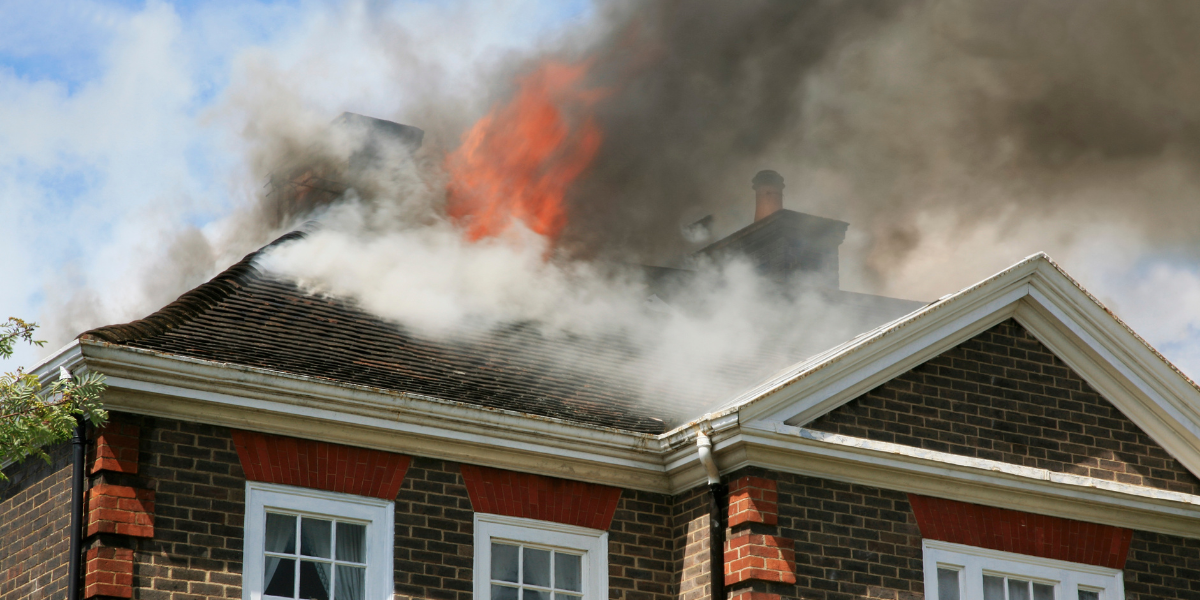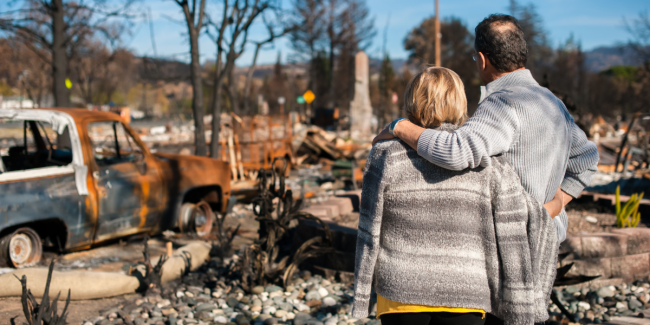
Top Reasons Insurance Companies Deny Fire Claims
As with many insurance claims, most insurance companies will try to deny any claim they can to pay out as little as possible and reserve more revenue for shareholders and corporate interests. However, this is particularly true for fire damage claims, as there are many well-established reasons why insurance companies deny them.
The Importance of Fire Insurance Coverage
Fire insurance is a type of homeowners insurance that may be part of the standard policy or an additional policy taken out by homeowners. It offers protection against damage from a fire, whether it starts within the home — such as from an appliance — or originates from outside — like fire spreading from a neighbor’s housefire or a wildfire.
Fire insurance covers a policyholder’s dwelling and likely extends to outbuildings on the property and losses to personal possessions. While standard homeowners insurance policies may include minimum fire insurance coverage, they may not be sufficient in most situations. Therefore, an additional policy or extra coverage may be required to ensure protection in the event of such a potentially catastrophic loss.
Reasons Insurance Companies May Deny Fire Claims
Here are five reasons insurance companies deny fire claims:
1. Non-Payment of Insurance Premiums
If you have not kept up with paying your insurance premiums, you may find that you do not actually have the coverage you need when you attempt to file a fire claim. This is a valid reason for an insurance provider to deny your claim, but only if the insurance company has followed all of the legally required procedures for letting you know your coverage has lapsed.
These procedures include warning the policyholder in writing in advance of canceling part or all of any insurance policy and providing you with a grace period to make payments and get back on track. If your insurer canceled your policy without first taking these measures, you may be able to argue that their attempt to deny your fire claim is invalid.
2. Lack of Adequate Coverage
As mentioned above, fire coverage with limits satisfactory to cover you in the event of a loss should never be taken for granted, and it’s always important to review your policy to ensure that you have adequate coverage before an incident strikes. With the recommended help of an experienced property insurance attorney who can analyze and explain the fine print of your insurance policy to you, it is important to carefully read the terms and conditions of your policy.
For example, most homeowners and business insurance policies have exclusions – instances where damage is not covered. It is critical to know how these types of exclusions, and the other fine print of the insurance policy, relate to fire damage.

3. Poor Maintenance or Workmanship
Another major reason that insurance companies deny fire claims is either poor design or workmanship by the contractor or poor maintenance by the owner. If your fire insurance claim is rejected for this reason, it means that the insurer is asserting that a part of your home was poorly designed, built, installed, maintained, or cared for.
The insurance company may try to claim that work on the home wasn’t properly inspected or licensed, and they may cite your inability to quickly gather supportive documents as clear proof that your home was fire-prone and faulty. The expectation is that you will not be able to gather the needed paperwork or that you made any mistakes along the way that the insurance company can take advantage of to deny your claim.
Thus, investing in the right practices before a fire – using duly licensed and insured contractors and performing regular maintenance – will pay dividends after the unfortunate event of a fire loss. As another tip, always maintain reasonable documentation along the way while living in and enjoying your home – including copies of signed contracts with architects and builders, copies of all permits taken out with the town, and updated photos of the condition of your home taken from time to time.
4. Arson, Negligence, or Doubtful Cause
The insurance company may imply or even expressly state that it is denying your claim due to suspicious circumstances surrounding your fire. For example, the insurance company may claim that you caused or contributed to the fire through reckless or illegal activities or even set the fire, known as arson.
They may claim that you failed to take reasonable steps to flame-proof your home or prevent obvious dangers, such as leaving on a stove or piling up papers or wood, and might call this your negligence. They may also simply deny your claim without making accusations, saying instead that they failed to find the cause of the fire to be sufficient enough for policy coverage to apply.
To combat this, seeking out a qualified inspector to make a report on your fire is always a best practice recommendation. The resulting report will provide support for your claim that the fire is a covered event, and by working with a licensed attorney, you can know before submitting any report if the findings align with the coverage you have available.
5. Incomplete Information, Misrepresentation or Fraud
In some cases, an insurance provider will deny a fire claim on the grounds that you failed to provide the required information, failed to check the right boxes, or failed to attach a piece of paperwork or proof.
In more extreme cases, insurance companies may claim that the information was willfully omitted or that the wrong information was deliberately included, for example, as part of an insurance fraud scheme. These are serious accusations, some of which have legal consequences, and an insurance company should not be permitted to make them without following certain legally required procedures and, if required, honoring the terms and conditions of the policy you paid for.
Tips for Preventing Fire Claim Denials and Protecting Your Rights
It is critical to think ahead for a tragic fire loss and to make sure to read and understand the terms and conditions of your insurance policy, keep the policy paid and up to date, maintain appropriate documentation that your home is reasonably constructed and maintained against fire dangers, and even take photos of your home, from time to time. These will help you when advocating for coverage under your policy and help to stop insurance companies from using the reasons insurance companies deny fire claims.
Navigate Fire Claim Denials with MMA Law Firm
As professionals who help clients interpret insurance policies, understand their rights, and recover on their losses every day, the Houston insurance attorneys at MMA Law Firm are well positioned to assist clients with insurance in the State of Texas, including making sure that insurance claims are processed in the proper timeframe in accordance with the law.
This blog published by MMA Law Firm is available for informational purposes only and is not intended to be legal advice on any subject matter. The content available on this website may not constitute the most up-to-date legal or other information.